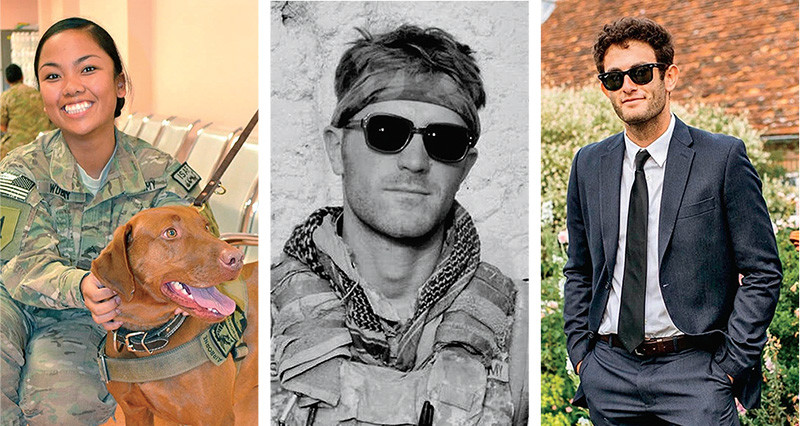When Sam Granoff ’21SOA taught a writing workshop on campus last year, he fielded the usual questions about how to get published. But he wanted to do something more than offer a list of resources. His students — all of them Columbia-affiliated military veterans — had a lot to say, and Granoff felt their stories deserved a wider audience.
More than eighteen million veterans live in the US, according to government figures, yet only a few publications specialize in showcasing their writing and art. Most of those tend to publish stories about combat and not veterans’ lives beyond war. That gap gave Granoff, now twenty-six, an idea. What if he and his classmates started their own journal — an online publication dedicated to creative work by veterans and members of military families?
Granoff recruited Jacob Thomas Schultz and Stephanie Wobby, veterans and fellow MFA writing students, to be the managing editors, while Granoff would serve as editor in chief. The three named the journal The Line — a reference to a line of text and also the frontline in war. Five more graduate students pitched in as associate editors. Last fall, the team reached out to veterans’ organizations for works of fiction, nonfiction, poetry, visual art, and veteran-to-veteran interviews.
Submissions ranged from historical fiction to personal essays, from postapocalyptic fantasies to family dramas. Many looked at facets of war a civilian might not expect. A short story, “Chicken Parm,” imagines a military base in Iraq under siege not from bullets but from weeks’ worth of chicken Parmesan meals sent to soldiers, who, quips writer Hunter Lu, “started to wonder if God hated them.”
The journal received support from Columbia Artist/Teachers (CA/T), which offers local communities free writing classes taught by MFA candidates and which ran Granoff’s veterans’ workshop. CA/T inspired The Line’s staff to create discussion materials to accompany each published piece that teachers can download. “We want high-school classrooms, not just literary spaces, to incorporate more veteran work,” says Schultz, thirty-six, who taught English after his military service.
Earlier this year, The Line held a virtual launch party that drew 150 people from around the country. At the event, Vietnam War veteran Bob Hanson read “Surprising God,” his poem about trauma and suicidal thoughts lingering after war: “Yes, you are home, but then there is the addiction, not of killing / but of forgetting.”
The first issue of The Line includes fiction by Matt Gallagher ’13SOA and a nonfiction piece, “The Question, The Answer,” by Lindsay Swoboda, who wrote about being pregnant between her military spouse’s deployments. “We don’t often think about military couples planning children and the hardships that come with that,” says managing editor Wobby, thirty, who served as a line medic in Iraq and Afghanistan.
For Wobby, a female veteran of color, the journal’s mission to highlight underrepresented voices is deeply personal. Born in the Philippines, she came to the US as a child, enlisted in the Army at seventeen, and at nineteen was sent to Iraq. Since leaving the military, she has written about the racism and sexual harassment she experienced during her service.
“I have a veteran’s license plate, but people assume I’m driving my husband’s car. They can’t picture women in the military,” says Wobby. “I want people not to make that assumption when they see those license plates. For that to happen, we need to share our stories.”
“COIN” (excerpt), by Matt Gallagher ’13SOA
The Iraqi police brought Ali the Prince to the outpost the next morning.
They’d beaten him with their rifle butts and flashlights after catching him on a rooftop hiding under blankets. A leper of blood and bruises, he was tall and thin and caked in dirt, not because of the police, but because he was a poor. He also couldn’t have been more than fifteen years old, three mustache hairs poking out at the world like broken teeth.
The boy looked scared and wore rags that said TEXAS RANGERS, WORLD SERIES CHAMPIONS. The soldiers laughed, because the Texas Rangers were not World Series Champions, but second-place losers, and clothes of second-place losers got sent to places like Tarhalah. I laughed with them, but didn’t really get it. Clothes were clothes for poors like Ali the Prince. It didn’t matter what was on them.
This article appears in the Spring/Summer 2021 print edition of Columbia Magazine with the title "Veterans' Voices."



